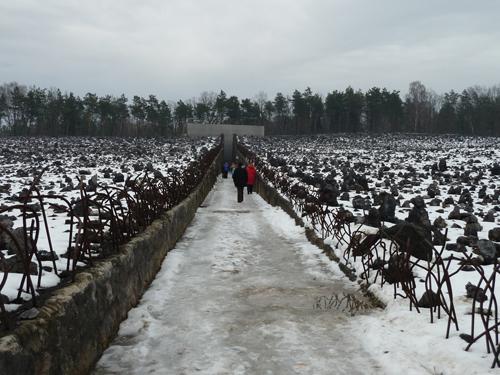
Participants in the SMU Embrey Human Rights Department’s annual World War II concentration camp observation walk through the Belzec extermination camp in the country of Poland this past Christmas Eve. (Photo courtesy of Maria Webster)
When Professor Rick Halperin announced in his Human Rights: America’s Dilemma class that he was taking his 15th trip to Poland over winter break to visit concentration camps, junior human rights minor Joe Cooper knew that’s where he would be spending his Christmas break.
Cooper realized he would be witnessing history first hand—visiting sites where more than 10 million people were murdered, making it what some people consider the worst atrocity of the 20th century.
“It was a crime that happened over 65 years ago, but there is still so much to learn from it,” he said. “There are not very many survivors left because that generation is dying off, but the legacy of the holocaust needs to be remembered forever.”
Cooper was one of 23 people on the trip, making it the largest group Halperin has ever taken to Poland.
As a human rights activists and educator, Halperin said, “It is my moral obligation to go to these sites and pay my respects to those—or the memory of those—who both survived through fortune or luck, and to remember those who didn’t survive, for no fault of their own.”
Thus, Halperin returns to Poland each year on the same dates, Dec. 18-30, to expose others to the brutal weather conditions and places where mass murder took place only a few decades ago.
While most on the trip said they did not know what to expect, nothing could have prepared this group for the unbearable weather this year.
“There was more snow this year than I’ve seen in the last 15 years,” Halperin said. “But, I think for the students, when you go to these places day after day, site after site, and you stand out there for eight hours a day in sub-freezing temps and heavy snow…you realize the people were out in those conditions in the equivalence of cotton pj’s—and some survived. You really see what it is for the will to live.”
However, the group quickly learned that the harsh weather conditions were only one factor as they experienced a “real in-your-face experience,” according to Halperin.
On Christmas Eve, the group traveled to Belzec—a site unheard of by many. Here, about 650,000 people were killed, according to Halperin. On Christmas Day, they spent the day at Majdanek, a site where 360,000 people were killed.
“Between these two sites, one million people were killed, and most people have never heard of these places,” Halperin said. “How the hell do you not hear about a place that killed 650,000?”
The most astonishing aspect of Majdanek is that it “looks like Germany left yesterday,” he said. “Victim’s hair, eyelashes, clothes, artificial limbs, shoes—it’s all there.”
This was an eye-opening experience for Cooper.
“It is an unbelievably sad example of the sheer brutality that humans are capable of inflicting upon each other,” he said. “At most of the extermination camps, [the Germans] completely destroyed the site and created a farm on the killing site and put a Ukrainian family on it to cover it up.”
Mara Webster, an eighth grade U.S. history teacher at Richardson ISD, said the trip was “moving and inspiring,” and considers returning again with Halperin.
“This trip made me value my life and the people in my life more than I ever did before,” she said.
Cooper agreed and hopes to bring his mother next time.
“It truly is a reality check that makes you count your blessings for what you have, even if it’s little,” he said.
Although Halperin has endured the weather and has seen the sites where inhumanity took place, each trip, he says, always feels like the first time, leaving him excited for the next year.
As time passes since World War II, Halperin explains, its legacy still lives on.
“People may be dying, but the horror—that ideology—is alive and well today, and that’s what we are trying to eliminate,” Halperin said. “Totalitarianism, fascism, genocide, hatred—it lives in this world today. It didn’t end in 1945.”








